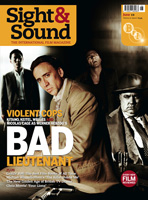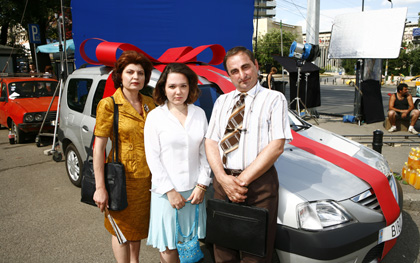Primary navigation

Romania/Netherlands 2009

Reviewed by Michael Brooke
Our synopses give away the plot in full, including surprise twists.
Bucharest, the present. Delia Fratila is to be presented with a Logan Break car that she has won in a competition run by Bibo Multifruit drinks, and to appear in a TV commercial as “the luckiest, happiest girl in the world”. Arriving in the city with her parents, Delia is seen to by Gabi the makeup artist. The Bibo brand manager stresses the importance of Delia smiling throughout. Delia and her mother argue about the car: her father wants to sell it and fund the redevelopment of her grandmother’s home into a guesthouse, but Delia wants it for herself.
The two-shot commercial begins with Delia walking to the car through an orange grove that will be matted in later via a blue-screen process. She is asked to remove her blue-patterned jacket. In the second shot, she sits in the car, delivers a line and swigs thirstily from a bottle of orange juice. After several takes, and to the director’s fury, Mihai remembers that the commercial is supposed to have a modern building in the background. Delia’s father asks her to sign over the car but she refuses. Shooting restarts, but the generator fails. The row between Delia and her father leads to a temporary rift. She eventually agrees to the deal, in exchange for cash upfront and her father’s car. After a few more takes, it’s too dark to continue. While Delia signs her father’s documents, the director assesses whether the material is usable. The crew pack up.
It will come as no surprise to anyone familiar with recent Romanian cinema that the title of Radu Jude’s debut proves deeply, cynically ironic. Despite having won a car in a fruit-juice competition, Delia Fratila (Andreea Bosneag) is anything but happy. For starters, her parents want to sell the car immediately to fund an entrepreneurial project that they unconvincingly assure her will generate more than enough cash two years down the line to fund anything she wants. Furthermore, a condition of victory is that Delia has to appear in a TV commercial, despite having no discernible acting chops – and even a seasoned professional would have difficulty conveying beaming bonhomie immediately after disowning her parents during yet another furious row between takes.
Director/co-writer Jude based the film on an incident from his own past as a commercials director, and refuses to glamorise his former profession. As in Jack Rosenthal’s fondly remembered TV play Ready When You Are, Mr. McGill (1976), to which Jude’s picture bears a more than glancing resemblance, the film-making process is depicted as a hard, thankless slog, each successive take marred by differing problems – a blue jacket (a no-no if a lush orangery is to be matted on later), visible facial hair, an inappropriate location, faulty equipment, or simply losing the light at the end of a long day. There’s also a running gag about the product itself, a bottle of artificial-looking juice that’s sprayed with glistening droplets immediately prior to each take, and later laced with Coca-Cola in an attempt to make it look more appetising on film. The director is constantly harassed by representatives of the fruit-juice company, who ultimately call the creative shots, cheerfully agreeing that their suggestions are stale and clichéd but citing extensive market research in their defence.
As in Cristi Puiu’s healthcare odyssey The Death of Mr. Lazarescu (2005), there’s nothing here that’s especially ‘Romanian’: the same story could easily be transplanted to any country where consumerism and glossy commercials hold sway, and where pipe dreams of instant fame and fortune are, if wildly unrealistic, at least not wholly unachievable. In the course of three lengthy arguments between Delia and one or both of her parents, the generational divide is laid bare – although it is never spelled out, Delia would have been born in the early 1990s, during the economic ravages that immediately followed communism’s collapse. Although she belittles her parents, their tales of hardship ring true, and their desire for their daughter not to fritter away her unexpected good fortune derives as much from harsh common sense as from personal selfishness. The film refuses to offer pat solutions, presumably in an effort to stimulate more constructive discussions among its audience.
Despite his commercials background, Jude shoots the film in what is now becoming so familiar as generically Romanian mise en scène that it’s in danger of becoming hackneyed. Most scenes consist of two- or three-way conversations, typically shot in long, unshowy takes by a largely static camera. Despite the presence of a crane and blue-screen rig on the set of the commercial, there is nothing in the actual film that requires such elaborate equipment, and neither is there any music aside from the calculated use of Pet Shop Boys’ ‘Rent’ over the opening credits. But the performances are wholly convincing, especially Bosneag’s mulish but naive Delia. A particularly telling moment sees her visibly recoiling from the film crew’s overtly sexual banter: for all her desire to sever links with her parents and move permanently to Bucharest, she’ll remain a small-town innocent for a fair bit longer.
Bedlam in brief: Radu Jude?s The Tube without a Hat reviewed at Bristol?s Encounters Festival (December 2009)
Where there’s pomp…: Tales from the Golden Age’s Cristian Mungiu interviewed by Nick Bradshaw (November 2009)
Eastern promise: Nick Roddick on Romanian cinema’s new wave (October 2007)
4 Months, 3 Weeks and 2 Days reviewed by Ben Walters (Film of the Month, January 2008)
California Dreamin’ (Endless) reviewed by Kieron Corless (April 2008)
The Death of Mr Lazarescu reviewed by Michael Brooke (August 2006)